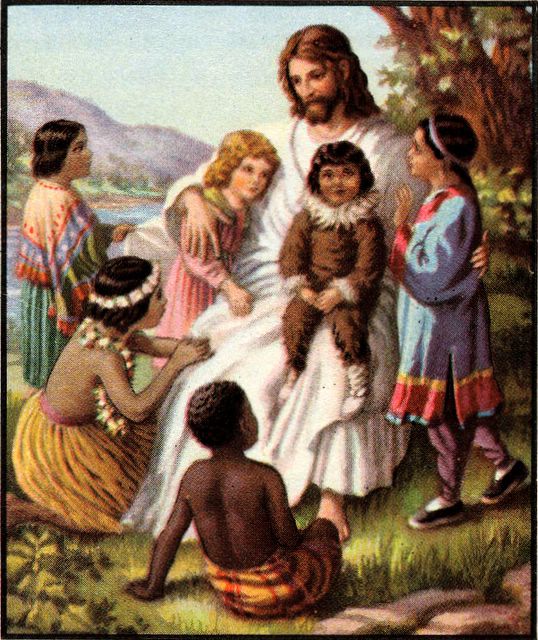
Ye Have Done It Unto Me
True worship consists in working together with Christ. "Pure religion and undefiled before God and the Father is this: To visit the fatherless and widows in their affliction, and to keep himself unspotted from the world." The love of Christ dwelling in the heart, will be manifested in earnest effort to accomplish the work which Jesus came to do. Kind words, deeds of benevolence, of tender care for the needy and the afflicted,--this is the fruit that grows naturally upon the good tree.
Such was the fruit manifest in the life of that righteous man of whom God himself declared, "There is none like him in the earth, a perfect and an upright man." Job says, "I delivered the poor that cried, and the fatherless, and him that had none to help him. The blessing of him that was ready to perish came upon me: and I caused the widow's heart to sing for joy. I put on righteousness, and it clothed me: my judgment was as a robe and a diadem. I was eyes to the blind, and feet was I to the lame. I was a father to the poor: and the cause which I knew not I searched out."
The Saviour invites us to become patient toilers in a field which calls for self-denying labor; but it is a glorious work, and one that God smiles upon. When one's heart sympathizes with others burdened with grief and discouragement; when his hand clothes the naked, and the stranger is made welcome to a seat at his fireside and at his board, then heaven comes very near. Brethren and sisters, when you open your doors to Christ's needy and suffering ones, you welcome with them unseen angels, who minister to these children of want and sorrow. You are inviting the companionship of heavenly beings. They bring with them a heavenly atmosphere of joy and peace. They come with praises upon their lips, and an answering strain is heard in heaven. Every deed of mercy and benevolence makes music there. The Father from his throne beholds and numbers the unselfish laborers among his most precious treasures. "And they shall be mine, saith the Lord of hosts, in that day when I make up my jewels."
Whoever succors the poor, or sympathizes with the afflicted and oppressed, or befriends the orphan, is brought into closer relationship with the pitying Saviour. He who is the Source of all blessing, has granted to men the privilege of becoming partakers of the divine nature, and in their turn, of diffusing blessings to their fellow-men. This is the highest honor, the greatest joy, which it is possible for God to bestow upon men. Those who thus become participants in labors of love are brought nearest to their Redeemer. He who refuses to become a laborer together with God, the man who for the sake of selfish indulgence ignores the wants of his fellow-men, is withholding from himself the richest blessings that God could give him. He shows that he has no connection with Jesus; for "if any man have not the Spirit of Christ, he is none of his."
"Then shall he say also unto them on the left hand, Depart from me, ye cursed, into everlasting fire, prepared for the devil and his angels: for I was an hungered, and ye gave me no meat: I was thirsty, and ye gave me no drink; I was a stranger, and ye took me not in; naked, and ye clothed me not; sick, and in prison, and ye visited me not. . . . Verily I say unto you, Inasmuch as ye did it not unto one of the least of these, ye did it not to me."
Jesus identifies himself with his suffering people. I was hungry and thirsty; I was a stranger; I was naked; I was sick; I was in prison. While you were enjoying the food from your bountifully spread tables, I was famishing with hunger in the hovel or street not far from you. When you closed your doors against me while your well-furnished rooms were unoccupied, I had not where to lay my head. While your wardrobes were filled with changeable suits of apparel, upon which means had been squandered that you might have given to the needy, I was destitute of comfortable raiment. When you were enjoying health, I was sick. Misfortune cast me into prison and bound me with fetters, bowing down my spirit depriving me of freedom and hope, while you roamed at liberty.
What a oneness Jesus here represents as existing between himself and his suffering disciples! He makes their case his own. He represents himself as being, in their person, the very sufferer. Mark this, selfish Christian; every neglect on your part to care for the needy and to sympathize with those in distress, is a neglect of Jesus in the person of his saints. Our heavenly Father has blessings disguised in our pathway. Angels are waiting to see if we embrace opportunities within our reach of doing good,--waiting to see if we will bless others, that they in their turn may bless us. The Lord himself has made us to differ, some poor, some rich, some afflicted, that all may have an opportunity of developing character. The poor are purposely permitted to be thus by God, that we may be tested and proved, and develop what is in our hearts.
HM, July 1, 1891